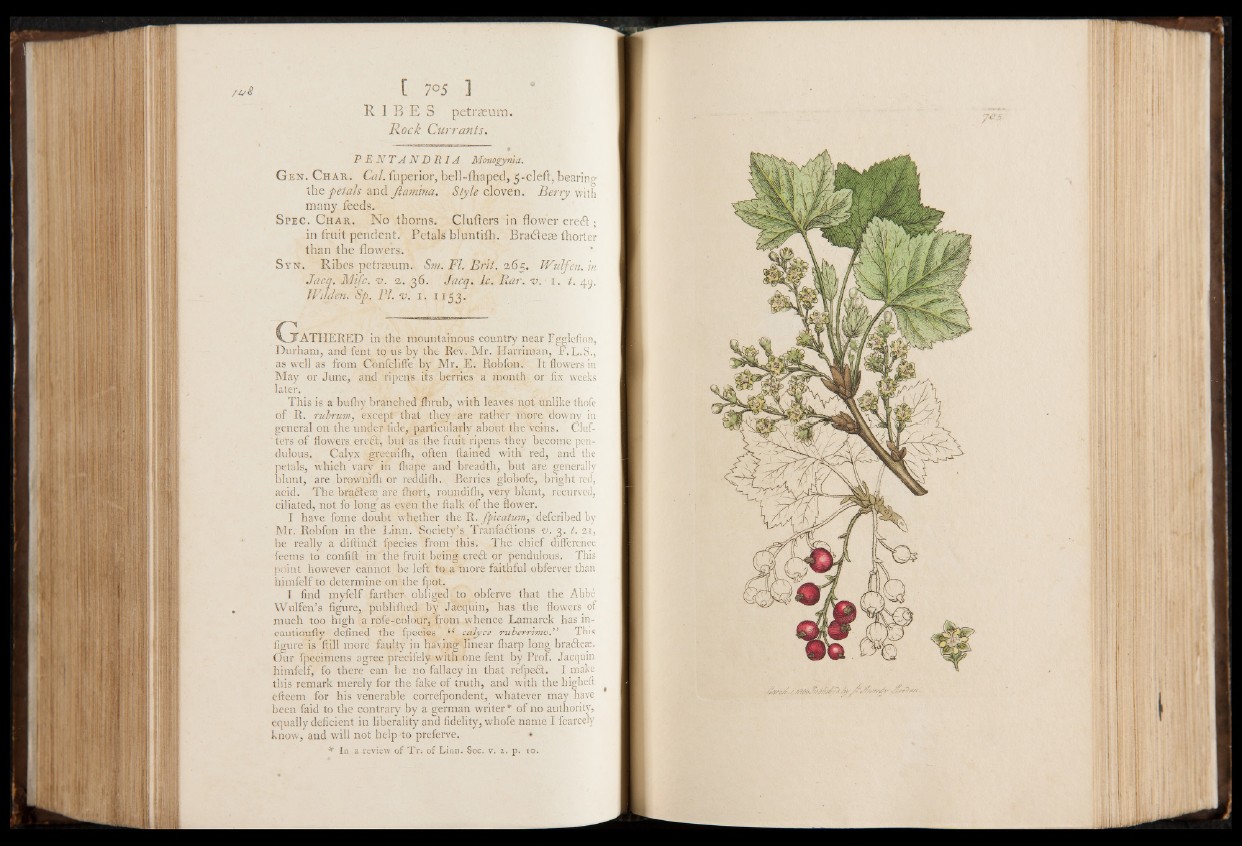
,«S [ 7 :°5 ]
R I B E 3 petrteurn.
Rock Currants.
P E N T A N D R IA Monogynia.
G en. C har. Cal. fnperior, bell-fhaped, 5 -cleft, bearing
the petals and Jlamina. Style cloven. Berry with
many feeds.
Spec. C har. N o thorns. Clufters in flower erefl ;
in fruit pendent. Petals bluntifh. Bradfeae fhorter
than the flowers.
Syn . Ribes petrasum. Sm. FI. Brit. 265. Wiulfen. in
Jacq. Mifc. v. 1. 36. Jacq. lc. Rar. v. ■ 1. t. 4y.
TVilclen. Sp. PI. v. 1. 1153.
( jT A TH E R E D in the mountainous country near Fgglefton,
Durham, and fent tp us by the Rev. Mr. Harriman, F.L.S.,
as well as from Confcliffe by Mr. E. Robi’on. It flowers in
May or June, and ripens its berries a month or fix weeks
later.
This is a bufhy branched fhrub, with leaves not unlike thofe
of R. rubrum, except that they are rather more downy in
general on the under fide, particularly about the veins. Clutters
of flowers eredt, buf as the fruit ripens they become pendulous.
Calyx grecnifh, often ftained with red, and the
petals, which vary in fhape and breadth, but are generally
blunt, are brownifh or reddifli. Berries globofe, bright red,
acid. The braftese are fhort, roundifli, very blunt, recurved,
ciliated, not fo long"as even the ftalk of the flower.
I have feme doubt whether the R. fpicatum, deferibed by
Mr. Robfon in the Linn. Society’s Tranfaftions v. 3. t. 21,
be really a diftiniSt fpecies from this. The chief difference
feems to confift in the fruit beings ereft or pendulous. This
point however cannot be left to a more faithful obferver than
himfelf to determine on the fpot.
I find myfelf farther obliged to obferve that the Abbe
Wulfen’s figure, publifhed by Jaeq'uin, has the flowers of
much too high a rofe-colour, from whence Lamarck has in-
cautioufly defined the fpecies (e calyce riiberrimo.” This
figure is ftill more faulty in having linear fharp long brafte®.
Our fpecimens agree precifely with one fent by Prof. Jacquin
himfelf, fo there can be no fallacy in that refpedt. I make
this remark merely for the fake of truth, and with the higheft
efteem for his venerable correfpondent, whatever may have
been faid to the contrary by a german writer * of no authority,
equally deficient in liberality and fidelity, whofe name I fcarcely
know, and will not help to preferve. •
* In a review of T o of Linn. Soc. v. 2, p. 10.